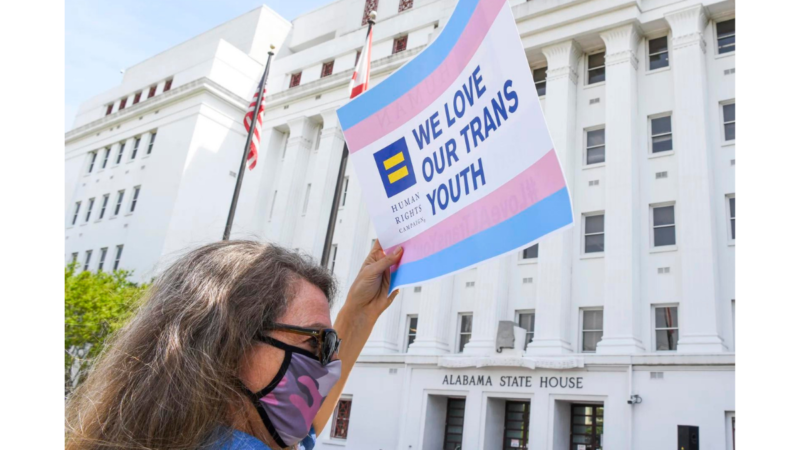EXPLAINER: What do new Alabama laws say about transgender kids?
Jodi Womack holds a sign that reads "We Love Our Trans Youth" during a rally at the Alabama State House to draw attention to anti-transgender legislation introduced in Alabama on March 30, 2021 in Montgomery, Ala.
MONTGOMERY, Ala. (AP) — Alabama has become the first state to criminalize the use of puberty blockers and hormones to treat transgender people under age 19. In line with some other Republican-led states, legislators here also passed a law requiring students to use bathrooms corresponding to their sex at birth and prohibiting discussion of gender and sexual identity in the lower grades. Critics have derided the limitation on such discussions as the “Don’t Say Gay” law.
The two GOP bills were signed into law Friday by Republican Gov. Kay Ivey, a day after being passed by the Alabama Legislature. Advocacy groups quickly filed a lawsuit Monday challenging the medication ban.
Republicans argue the bills are needed to protect children and that decisions on gender-affirming medications should wait until adulthood. Critics say the politicians are interfering with medical decisions that belong with families and their doctors. Cathryn Oakley, state legislative director and senior counsel for the Human Rights Campaign, a national advocacy group for the LGBTQ community, called the two pieces of legislation “the single most anti-transgender legislative package in history.”
What does the treatment ban do?
Titled the “Alabama Vulnerable Child Compassion and Protection Act,” the law makes it a crime to prescribe or administer to anyone under 19 puberty blockers or hormone treatment “for the purpose of attempting to alter the appearance of or affirm the minor’s perception of his or her gender or sex.”
Legislators made it a Class C felony to violate the law, meaning doctors who prescribe or administer such medication would be subject to up to 10 years in prison.
The law, which takes effect on May 8 unless blocked by the courts, also bans surgeries for the purpose of altering gender appearance, but doctors say those are generally not performed on minors.
Alabama’s legislation goes further than measures passed in other states. Arkansas was the first state to pass a ban on gender-affirming drugs, but its measure did not include criminal penalties. The Arkansas law was blocked by a federal judge before it could go into effect. Texas Gov. Greg Abbott ordered the state’s Department of Family and Protective Services to investigate as child abuse reports of youth receiving such care.
What are the criticisms?
Doctors, families and advocacy organizations say politicians are inserting themselves into decisions that belong with families and medical teams. The measures have prompted swift backlash from medical experts, Democratic President Joe Biden’s administration, the U.S. Department of Justice and the families of trans youth. Doctors say the Alabama law is contrary to peer-reviewed research and applies a criminal label to standard medical care. Health experts also say that minors with gender dysphoria who do not receive appropriate medical care face dramatically increased risk of suicide and serious depression.
Does the law do anything else?
Yes. The law requires counselors, teachers, principals and other administrators — in both public and private schools — to tell parents if a child discloses that they think they may be transgender. It also prohibits school staff from encouraging students to withhold the information from their parents.
What does the bathroom and “Don’t Say Gay” law do?
The second piece of legislation signed by Ivey involves public school bathroom use and classroom instruction.
The law requires students in grades K-12 to use multi-person bathrooms and locker rooms that correspond to their sex at birth rather than their gender identity. It also prohibits teachers and others who provide lessons to grades K-5 from talking about sexual orientation or gender identity “in a manner that is not age appropriate or developmentally appropriate for students in accordance with state standards.”
Critics have labeled a similar measure passed in Florida that applies to grades K-3 the “Don’t Say Gay” law.
What happens next?
Opponents of the medication ban who filed the lawsuit are hoping a judge will grant their request to block it. A legal challenge is also expected to be filed against the bathroom and classroom-instruction measures.
The U.S. Department of Justice sent a letter to states warning that efforts to block transgender minors from accessing gender-affirming care may be violating federal law and the constitutional protections.
House Dem. Leader Jeffries responds to air strikes on Iran by U.S. and Israel
NPR's Emily Kwong speaks to House Minority Leader Hakeem Jeffries (D-NY), who is still calling for a vote on a war powers resolution following a wave of U.S.- and Israel-led airstrikes on Iran.
Iran’s Ayatollah Ali Khamenei is killed in Israeli strike, ending 36-year iron rule
Khamenei, the Islamic Republic's second supreme leader, has been killed. He had held power since 1989, guiding Iran through difficult times — and overseeing the violent suppression of dissent.
Found: The 19th century silent film that first captured a robot attack
A newly rediscovered 1897 short by famed French filmmaker Georges Méliès is being hailed as the first-ever depiction of a robot in cinema.
‘One year of failure.’ The Lancet slams RFK Jr.’s first year as health chief
In a scathing review, the top US medical journal's editorial board warned that the "destruction that Kennedy has wrought in 1 in office might take generations to repair."
Here’s how world leaders are reacting to the US-Israel strikes on Iran
Several leaders voiced support for the operation – but most, including those who stopped short of condemning it, called for restraint moving forward.
How could the U.S. strikes in Iran affect the world’s oil supply?
Despite sanctions, Iran is one of the world's major oil producers, with much of its crude exported to China.




